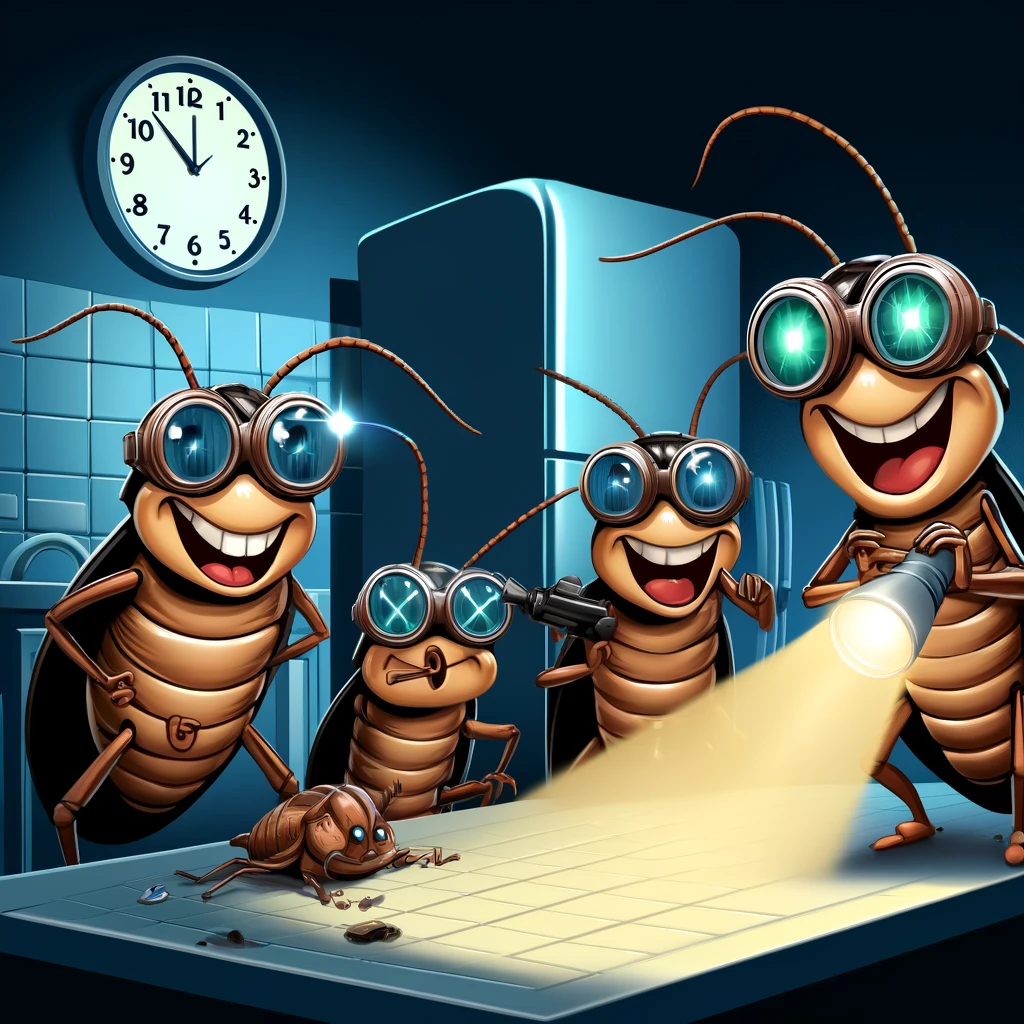Why Do Water Bugs Come Out At Night?
 Water bugs, commonly known as cockroaches, are notorious for their nocturnal activity. If you’ve ever switched on a light at night and seen these pests scurrying away, you might wonder why they are more active after dark. In this article, we’ll explore the reasons behind the nighttime behavior of water bugs, their survival strategies, and how to manage their activity to keep them out of your home.
Water bugs, commonly known as cockroaches, are notorious for their nocturnal activity. If you’ve ever switched on a light at night and seen these pests scurrying away, you might wonder why they are more active after dark. In this article, we’ll explore the reasons behind the nighttime behavior of water bugs, their survival strategies, and how to manage their activity to keep them out of your home.
Understanding Nocturnal Behavior
Adaptation to Avoid Predators
One of the primary reasons water bugs are nocturnal is to avoid predators. Many of their natural enemies, such as birds, reptiles, and larger insects, are more active during the day. By coming out at night, water bugs can reduce the risk of being eaten.
Environmental Factors
- Temperature and Humidity: Water bugs thrive in warm and humid environments. Nighttime often provides the ideal conditions for these insects to remain active and forage for food without the risk of drying out.
- Reduced Disturbance: Human activity tends to decrease at night, providing a quieter and safer environment for water bugs to explore and search for food without interference.
Foraging for Food
Food Availability
Water bugs are opportunistic feeders and will eat a wide variety of organic materials. At night, they can forage for food more effectively, as there is less competition and disturbance from humans and other animals.
Hiding Spots
During the day, water bugs hide in dark, damp places such as under sinks, behind appliances, and in basements. At night, they come out to search for food, knowing that these hiding spots will keep them safe until they need to return.
Reproduction and Social Behavior
Mating Activity
Water bugs, like many insects, are more likely to engage in mating behaviors at night. The cover of darkness provides a safer environment for finding and attracting mates without the threat of predation.
Communication
Water bugs use chemical signals called pheromones to communicate with each other. These signals are often more effective at night when there is less air movement and interference, allowing them to coordinate activities such as foraging and mating.
Managing Nocturnal Activity
Maintaining Cleanliness
- Regular Cleaning: Keep your home clean, especially kitchens and bathrooms, to remove food sources and reduce hiding spots.
- Proper Food Storage: Store food in sealed containers and dispose of garbage regularly.
Reducing Moisture
- Fix Leaks: Repair any leaky faucets and pipes to reduce moisture levels.
- Use Dehumidifiers: In damp areas, use dehumidifiers to lower humidity levels.
Sealing Entry Points
- Close Off Cracks and Gaps: Use caulk and weather stripping to seal cracks and gaps where water bugs might enter.
- Install Screens: Ensure that windows and vents have tight-fitting screens to keep water bugs out.
Using Traps and Baits
- Traps: Place sticky traps in areas where you have seen water bugs to monitor and reduce their numbers.
- Baits: Use cockroach baits in strategic locations to attract and kill water bugs.
Professional Pest Control
For severe infestations, consider hiring a professional pest control service. Professionals can provide comprehensive inspections and targeted treatments to effectively manage and eliminate water bug populations.
Conclusion
Water bugs come out at night primarily to avoid predators, take advantage of favorable environmental conditions, and forage for food. Understanding their nocturnal behavior can help you implement effective strategies to manage and prevent infestations. By maintaining cleanliness, reducing moisture, and sealing entry points, you can create an environment that is less inviting to these nocturnal pests.
Call to Action
If you’re dealing with a water bug problem, take proactive steps to address it. Regular cleaning, moisture control, and sealing entry points are key to preventing infestations. For persistent issues, don’t hesitate to contact a professional pest control service for expert assistance.
- The Life Span of a Cockroach
- Do Cockroaches Eat Clothes?
- Do Cockroaches Have Teeth?
- Shrimps and Cockroaches
- Will Sleeping with the Light On Keep Cockroaches Away?
- How to get roaches out of your car overnight
- Do Cockroaches Feel Pain?
- How Many Legs Do Cockroaches Have?
- Comparing Cockroach Eggs Size for Different Types of Cockroaches
- Identifying a Cockroach Bite on the Lips or Face
- Black Water Bug Identification and Control
- Why Do Water Bugs Come Out At Night?
- What Does Roach Rash Look Like?
- Can Cockroaches Bite Your Eyelid?
- Can Cockroaches Live in Your Balls?
- How did cockroaches get their name?
- Why Do Cockroaches Shed Their Skin?
- What Smell do Palmetto Bugs Hate?
- Baby Palmetto Bug: Identification and Control
- Cockroach Eggs vs Poop: How to Tell the Difference
- How to Get Rid of Water Bugs
- How Long Can a Cockroach Live Without Air?
- The Lifecycle of the German Cockroach: From Egg to Adult
- Do Mice Eat Roaches
- Wood Roach vs. Cockroach

